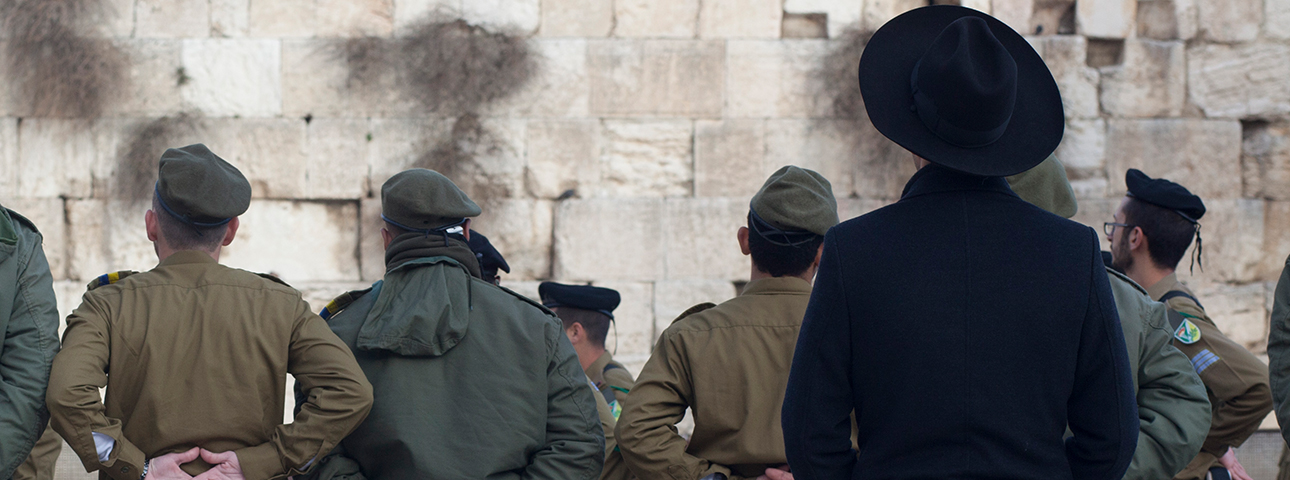Perceptions on Citizenship among Ultra-Orthodox Israelis
Despite the fact that the State of Israel and its central institutions are essentially secular and reflect a Zionist self-image, according to data from the 2016 Democracy Index only two-thirds (64%) of ultra-Orthodox Israelis report having a strong sense of belonging to the state.

Flash 90
Belonging, Identity, and Identification
Between 2003 and 2016, there was a decline in the ultra-Orthodox community’s sense of belonging to the State of Israel, from 70.4% to 60%-- lower than among other Jews in Israeli society during those years. One possible explanation for this decline in ultra-Orthodox Israelis’ self-reported sense of belonging would seem to lie in the growing harshness of the public, political, media, and judicial discourse targeted at the ultra-Orthodox population in recent years, and which focused on increasing demands for ultra-Orthodox integration into military service, the labor market, and higher education.
A study by Dr. Lee Cahaner, a researcher at the Israel Democracy Institute, found that in 2018, some 60% of ultra-Orthodox Israelis reported that they do not feel part of the State of Israel. Around a quarter (23%) indicated a moderate sense of belonging, and only 18% have a strong sense of belonging to the State. A breakdown of these responses by employment status and by the as on the “conservative-modern” spectrum, reveals that 70% of conservative ultra-Orthodox Israelis and 61% of full-time yeshiva students do not feel part of the State of Israel, compared with 45% of those who are working in employment and 37% of the ”modern ultra-Orthodox“.
Pride in being Israeli
According to the findings of the Israeli Democracy Index, between 2016 and 2018, a clear majority (72.2%) of ultra-Orthodox Israelis were “very proud” to be Israeli—less than among national-religious (95.3%) or secular (83.2%) Israelis, but still a sizable majority.
These findings are supported by data from a 2019 study by Dr. Lee Cahaner which found that some two-thirds (67%) of ultra-Orthodox Israelis are either “proud” or “very proud” to be Israeli. In addition, this study showed significant variation within the ultra-Orthodox community on this issue. While only 54% of conservative ultra-Orthodox Israelis and 55% of full-time yeshiva students expressed a strong sense of pride in being Israeli, the figures rise to 69% among modern ultra-Orthodox Israelis and 78% among those who are employed.
Trust in Public Institutions
In all sectors of Israeli society there has been a clear decline in trust in the Knesset since the beginning of the millennium. The percentage of ultra-Orthodox Israelis expressing trust in the Knesset between 2016–2018 is extremely low, at 21.9%, but is identical to the figure among secular Israelis over the same period.
The level of trust in Israel’s presidency among the ultra-Orthodox is significantly lower than that among the rest of the Jewish population. In recent years, only about one-third of the ultra-Orthodox express trust in the presidency, compared with some three-quarters (76.4%) of traditional Jews, and a large majority (83.3%) of secular Jews.
Between 2003 and 2004, the proportion of ultra-Orthodox Israelis expressing a high degree of trust in the courts was around 18%, but this dropped to just 9% in 2016–2017. This finding indicates a severe crisis of trust in Israel’s legal system within the ultra-Orthodox public.
Trust in the IDF remains very high among all Israeli Jews. Only in the ultra-Orthodox community was there n a noticeable decline in such trust between 2002–2003(84.5%), and 2017–2018 (62.5%. %. It can only be assumed that the highly publicized struggles over the issue of military conscription (“equal sharing of the burden”) have undercut ultra-Orthodox support for, and trust in the IDF.
Regarding the degree of trust in democracy as the best form of government, there has been a significant decline among ultra-Orthodox respondents—from 83% who believed that democracy is the best form of government in 2000, to around 58% in 2011. A similar decline can be seen in the national religious community. In addition, around 40% of ultra-Orthodox Israelis and 52% of secular Israelis believe that there is a real threat to democratic government in Israel.
Influence on Government Decisions
Among Israel’s secular public, there has been a rise in the proportion of those who believe that they have a great degree of influence on government policy, from just 17% in 2003–2004 to 32.8% in 2017–2018. By contrast, among the ultra-Orthodox sector, we can note a fall from 24.5% at the beginning of the millennium to just 16.2% at the end of the current decade, despite an increase in the number of ultra-Orthodox Knesset members, and despite many government decisions that have been favorable to the ultra-Orthodox community.
Conclusion
The sense of belonging and pride in their Israeliness among a majority of ultra-Orthodox is more circumscribed and not as strong as that of other groups in Israel’s Jewish population. Their religious and Jewish identity is extremely dominant. Despite internal differences among within the ultra-Orthodox, overall- around two-thirds of ultra-Orthodox Israelis believe that the democratic component of the Israel identity as compared with the Jewish component is too strong. Accordingly, the level of trust of most ultra-Orthodox Israelis in State and public institutions such as the courts, the presidency, and even the IDF, is lower than that among other Jewish populations. Similarly, their identification with national holidays such as Independence Day and Memorial Day is also relatively low (although there are differences in the level of identification between the two days mentioned).Ultra-Orthodox attitudes towards Israel’s Arab minority are discriminatory and non-egalitarian. More than half of ultra-Orthodox Israelis believe that Jews should have more rights than non-Jewish citizens; around two-thirds believe that most Jews “are better” than most Arabs; most are disturbed when hearing conversations in Arabic; and they are more uneasy than other Jewish groups when being treated by Arab doctors and nurses. Most ultra-Orthodox Israelis have no significant social ties outside of their social networks within their communities or neighborhoods, and not surprisingly, most want to maintain the community’s isolationist character, rather than becoming a part of the Israeli mainstream.
